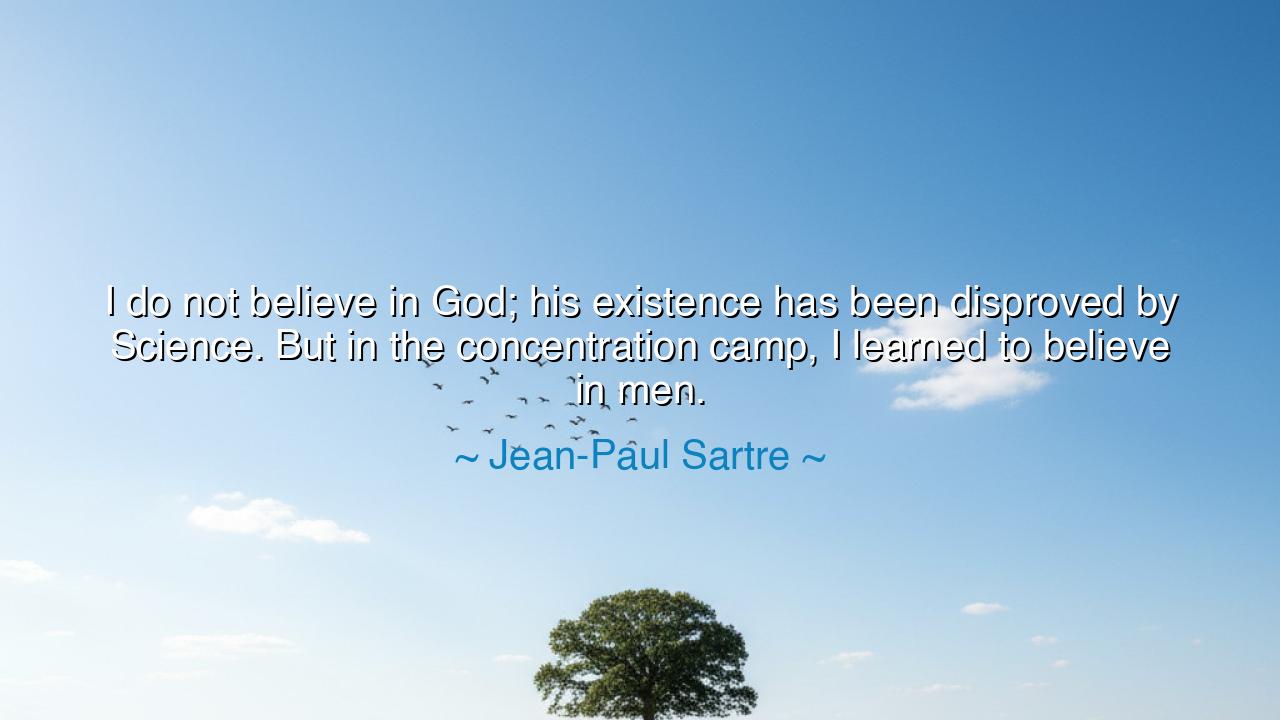
I do not believe in God; his existence has been disproved by
I do not believe in God; his existence has been disproved by Science. But in the concentration camp, I learned to believe in men.






"I do not believe in God; his existence has been disproved by Science. But in the concentration camp, I learned to believe in men." These words, spoken by the existential philosopher Jean-Paul Sartre, cut through the veils of faith and doubt with the sharpness of a sword. Sartre’s declaration is not just a philosophical statement; it is a testament to the human spirit, a profound reflection on the depths of suffering and the power of humanity itself. At a time when the world was torn apart by war and devastation, Sartre’s words became a cry for recognition of the strength, resilience, and goodness that can emerge in the darkest of times.
The philosopher's journey from atheism to a belief in human beings—not in a God, but in the power of men—was forged in the crucible of one of history’s most horrific chapters. In the concentration camps of World War II, Sartre witnessed not only the brutality of mankind but also the compassion, courage, and selflessness that some individuals showed in the face of unspeakable suffering. The camps, where life was reduced to a struggle for survival, forced those within them to confront the very essence of human nature. There, in the throes of despair and death, Sartre discovered that even in the face of human cruelty, there could still exist an undeniable force for good—the will to act with dignity, to care for one another, and to resist the darkness with acts of solidarity.
Before the war, many, including Sartre, looked to science and reason to explain the universe and the meaning of life. The scientific worldview, which had revolutionized our understanding of the world, had also, in some ways, dispelled the need for a divine presence. The mechanistic laws of physics and biology seemed to provide all the answers to existence, leaving little room for the metaphysical. In Sartre’s eyes, the question of God’s existence had been made obsolete by the progress of human knowledge. And yet, in the horrifying suffering of the concentration camps, he saw something that science could not explain: the profound potential for human beings to choose love, to choose hope, to act with humanity even in the most degrading circumstances.
Consider the story of Dietrich Bonhoeffer, a German pastor and theologian who was imprisoned for his resistance against the Nazi regime. Bonhoeffer, too, lived through the horrors of war, but in the darkest moments, he found the strength to cling to his belief in humanity. In the face of Nazi oppression, he saw that there was a greater calling than blind faith in any divine being—there was the call to live with integrity, to act justly, and to stand firm against evil. His own journey mirrored Sartre’s realization, that even in the absence of traditional belief, the actions of men—rooted in compassion and moral courage—could bring about the greatest good.
What Sartre’s words reveal is not just a rejection of faith, but a profound shift in understanding human potential. By learning to believe in men, Sartre found a new source of meaning in the face of suffering. It was in the suffering of his fellow man that he found a reason to hope, a reason to believe, not in the heavens, but in the human heart. He understood that humanity—though flawed, though capable of great cruelty—also held within it an incredible capacity for goodness, for sacrifice, and for hope. This is a belief that transcends any one religious or philosophical doctrine. It is the belief that, in the end, the measure of our worth is found not in our faith in the divine, but in our capacity for kindness, for resilience, and for love.
So, what lesson do we draw from Sartre’s painful yet enlightening journey? It is this: in the darkest moments of life, when all seems lost, it is not some divine being or unseen force that sustains us, but the very actions of those around us. The belief in humanity becomes the light that guides us through the dark corridors of our own suffering. It is the willingness to see beyond our divisions, to see the humanity in others, and to respond with compassion and solidarity. In doing so, we not only uplift others, but we uplift ourselves, finding meaning and purpose in our shared experiences.
In your own life, seek to believe in men—not as perfect beings, but as creatures capable of incredible strength and resilience. Look for the goodness in others, especially when times are difficult. When faced with adversity, do not retreat into despair, but draw upon the courage and strength of your fellow human beings. As Sartre discovered in the concentration camps, the true measure of humanity is not found in grand, abstract ideas, but in the concrete, everyday actions of compassion, courage, and love that bind us all together. Choose to act with dignity and kindness, and in doing so, you will be part of the human race’s most profound and enduring legacy.






AAdministratorAdministrator
Welcome, honored guests. Please leave a comment, we will respond soon